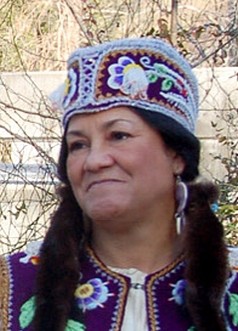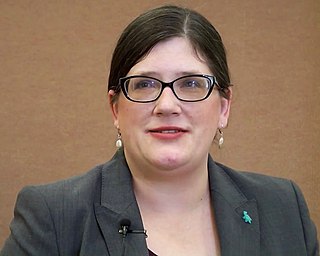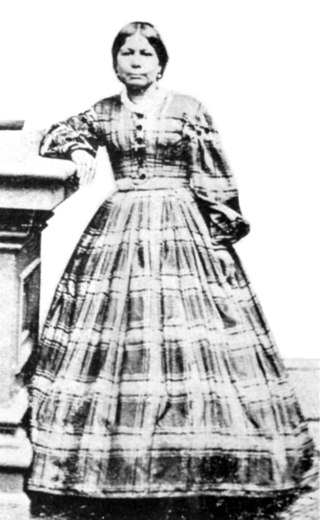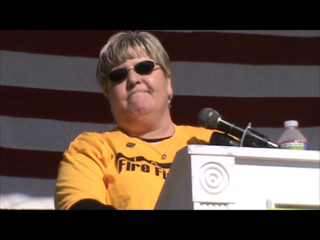Related Research Articles
State-recognized tribes in the United States are organizations that identify as Native American tribes or heritage groups that do not meet the criteria for federally recognized Indian tribes but have been recognized by a process established under assorted state government laws for varying purposes or by governor's executive orders. State recognition does not dictate whether or not they are recognized as Native American tribes by continually existing tribal nations.

The Choctaw Nation of Oklahoma is a Native American reservation occupying portions of southeastern Oklahoma in the United States. At roughly 6,952,960 acres, it is the second-largest reservation in area after the Navajo, exceeding that of eight U.S. states. The seat of government is located in Durant, Oklahoma.

The Native American tribes in Virginia are the Indigenous peoples whose tribal nations historically or currently are based in the Commonwealth of Virginia in the United States of America.

Joy Harjo is an American poet, musician, playwright, and author. She served as the 23rd United States Poet Laureate, the first Native American to hold that honor. She was also only the second Poet Laureate Consultant in Poetry to have served three terms. Harjo is a member of the Muscogee Nation and belongs to Oce Vpofv. She is an important figure in the second wave of the literary Native American Renaissance of the late 20th century. She studied at the Institute of American Indian Arts, completed her undergraduate degree at University of New Mexico in 1976, and earned an MFA degree at the University of Iowa in its creative writing program.

G. Anne Nelson Richardson is a Rappahannock woman and the first woman Chief to lead a tribe in Virginia since the 18th century.
Virginia Women in History was an annual program sponsored by the Library of Virginia that honored Virginia women, living and dead, for their contributions to their community, region, state, and nation. The program began in 2000 under the aegis of the Virginia Foundation for Women and Delta Kappa Gamma Society International; from 2006 to 2020 it was administered by the Library of Virginia. In 2021, it was replaced by the Strong Men and Women in Virginia History program.

Sarah Deer is a Native American lawyer, and a professor of Women, Gender, and Sexuality studies and Public Affairs and Administration at the University of Kansas. She was a 2014 MacArthur fellow and has been inducted into the National Women's Hall of Fame in 2019.

Harry James Watson "Jimmy" Belvin was a Native American educator who served as an Oklahoma State Representative and Senator. He was the first elected principal chief of any of the Five Civilized Tribes in the 20th century, and the longest serving principal chief of the Choctaw Nation of Oklahoma. He saw his tribe through termination, restoration, and a rebirth of Native Pride. He was a polarizing leader, seen by some as a semi-dictator who held onto the office of principal chief and used his power to advocate for complete assimilation into the dominant society, suppressing Choctaw traditions, language and ceremonial practices as undesirable remnants of an unrefined history. To others, he was a well-liked, populist leader, who went door-to-door talking with tribe members, informing them on issues, and trying to develop the means the alleviate the poverty and unemployment they faced.
Karenne Wood was a member of the Monacan Indian tribe who was known for her poetry and for her work in tribal history. She served as the director of the Virginia Indian Programs at Virginia Humanities, in Charlottesville, Virginia, U.S. She directed a tribal history project for the Monacan Nation, conducted research at the National Museum of the American Indian, and served on the National Congress of American Indians' Repatriation Commission. In 2015, she was named one of the Library of Virginia's "Virginia Women in History".
Sharon Rebecca Bryant was an American tribal politician who served as the Chief of the Monacan Indian Nation from 2011 until her death in 2015. She was the first woman to hold the position of Chief of the Monacan Indian Nation, a state-recognized tribe based in the Bear Mountain region of Amherst County, Virginia. Bryant, who was elected chief in 2011, led the ongoing efforts to win federal recognition for the Monacans.
Mollie Wade Holmes Adams was an Upper Mattaponi tribal elder and advocate of tribal culture in Virginia. She advocated for recognition of the tribe and worked to preserve traditional skills and knowledge. She was selected for the Virginia Women in History program by the Library of Virginia.

Emma Tyler Fielding Baker December 5, 1828 – January 20, 1916) was a member of the Mohegan Pequot Indian tribe and was posthumously awarded the title of Mohegan medicine woman in 1992. Medicine women were culture-bearers and required to have an in-depth knowledge of tribal customs and possess good leadership qualities. She was also a tribal historian and ceremonial leader of the Mohegan Tribe.

Doris Crouse-Mays is an American labor leader.

Naomi Silverman Cohn was an American social activist and government worker. She cofounded the Virginia Council on State Legislation which followed legislative bills dedicated to women's issues. Cohn directed the Division of Women and Children of the Virginia Department of Labor and Industry until 1942. Her activism resulted in posthumous recognition by the Women of Virginia Historic Trail and Virginia Women in History. Cohn's name was added to the Virginia Women's Monument in 2020.

Mary Elizabeth Nottingham Day was a painter under the professional name Elizabeth Nottingham. She was primarily known for her work depicting the landscape of Virginia. With her husband, painter Horace Day, she co-directed the art department of Mary Baldwin College in Staunton, Virginia from 1941 to 1956.

India Hamilton was an African-American educator.

Caroline Bradby Cook was a Pamunkey leader and Union sympathizer who championed the rights of Virginia's Native Americans and their cultural heritage.
Rachel Findlay was a Native American mixed race woman who was illegally enslaved for over fifty years and twice sued Virginia for her rightful freedom, successfully winning her case in 1820.
Mary Hatwood Futrell is an American educator, professor, and pioneer in women's rights education. In her unprecedented six-year-term as president of the National Education Association, she worked to advocate for students in poorer and lower-achieving schools.
Fannie Bayly King was an advocate for women's suffrage and social reforms in the early 20th century.
References
- 1 2 3 4 "Mary Belvin Wade · Virginia Changemakers". edu.lva.virginia.gov. Retrieved 2023-08-03.
- ↑ Kierner, Cynthia A.; Loux, Jennifer Renee; Shockley, Megan Taylor (2013). Changing History: Virginia Women Through Four Centuries. Library of Virginia. ISBN 978-0-88490-212-6.
- ↑ "NAIMS: Visions and Voices | ISPU". 2022-10-27. Retrieved 2023-08-03.
- ↑ Murphree, Daniel S. (2012-03-09). Native America: A State-by-State Historical Encyclopedia [3 volumes]: A State-by-State Historical Encyclopedia. ABC-CLIO. ISBN 978-0-313-38127-0.
- ↑ "Mary Belvin Wade and Powhatan Red Cloud-Owen · Virginia Indian Archive". www.virginiaindianarchive.org. Retrieved 2023-08-03.
- ↑ "Virginia Women in History 2005 · Virginia Changemakers". edu.lva.virginia.gov. Retrieved 2023-08-03.